Piano Sheet Music
 "... I don't want you to play me a riff that's going to impress Joe Satriani; give me a riff that makes a kid want to go out and buy a guitar and learn to play ..." Ozzy Osbourne
"... I don't want you to play me a riff that's going to impress Joe Satriani; give me a riff that makes a kid want to go out and buy a guitar and learn to play ..." Ozzy Osbourne
J. S. Bach
Johann Sebastian Bach (21 March 1685, O.S.31 March 1685, N.S. – 28 July 1750, N.S.) was a German composer, organist, harpsichordist, violist, and violinist whose sacred and secular works for choir, orchestra, and solo instruments drew together the strands of the Baroque period and brought it to its ultimate maturity. Although he did not introduce new forms, he enriched the prevailing German style with a robust contrapuntal technique, an unrivalled control of harmonic and motivic organisation, and the adaptation of rhythms, forms and textures from abroad, particularly from Italy and France.
Revered for their intellectual depth, technical command and artistic beauty, Bach's works include the Brandenburg Concertos, the Goldberg Variations, the Partitas, The Well-Tempered Clavier, the Mass in B minor, the St Matthew Passion, the St John Passion, the Magnificat, A Musical Offering, The Art of Fugue, the English and French Suites, the Sonatas and Partitas for solo violin, the Cello Suites, more than 200 surviving cantatas, and a similar number of organ works, including the famous Toccata and Fugue in D minor and Passacaglia and Fugue in C minor, as well as the Great Eighteen Chorale Preludes and Organ Mass.
Bach's abilities as an organist were highly respected throughout Europe during his lifetime, although he was not widely recognised as a great composer until a revival of interest and performances of his music in the first half of the 19th century. He is now generally regarded as one of the main composers of the Baroque style, and as one of the greatest composers of all time.
Revered for their intellectual depth, technical command and artistic beauty, Bach's works include the Brandenburg Concertos, the Goldberg Variations, the Partitas, The Well-Tempered Clavier, the Mass in B minor, the St Matthew Passion, the St John Passion, the Magnificat, A Musical Offering, The Art of Fugue, the English and French Suites, the Sonatas and Partitas for solo violin, the Cello Suites, more than 200 surviving cantatas, and a similar number of organ works, including the famous Toccata and Fugue in D minor and Passacaglia and Fugue in C minor, as well as the Great Eighteen Chorale Preludes and Organ Mass.
Bach's abilities as an organist were highly respected throughout Europe during his lifetime, although he was not widely recognised as a great composer until a revival of interest and performances of his music in the first half of the 19th century. He is now generally regarded as one of the main composers of the Baroque style, and as one of the greatest composers of all time.
Paul De Senneville
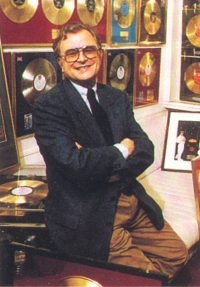
Paul de Senneville, a French songwriter and music producer.
As a director of a record company, Disc AZ, he started a new career on the basis of his passion in life: music.
After writing his first song in 1962, he contributed music for songs in many movie soundtracks produced by French companies such as Univers Galaxie and Daber Films. In 1968, while managing Michel Polnareff's career, he met Olivier Toussaint, forming a successful songwriting partnership. with songs were recorded by major French artists such as: Mireille Mathieu, Michèle Torr, Christophe, Hervé Vilard, Dalida, Petula Clark and Claude François. This partnership accounts for over 100 million records sold internationally. Partnering with lyricist Jean-Loup Dabadie, he wrote Tous les bateaux, tous les oiseaux, a French hit recorded by Michel Polnareff.
Very soon, they also got involved in Production business. They started up the group Pop Concerto Orchestra. which Olivier Toussaint sang as a lead singer there. Soon after, they launched their second group Anarchic System that produced Rock & roll music. Over a period of 5 years, both groups sold several millions of records.
As a director of a record company, Disc AZ, he started a new career on the basis of his passion in life: music.
After writing his first song in 1962, he contributed music for songs in many movie soundtracks produced by French companies such as Univers Galaxie and Daber Films. In 1968, while managing Michel Polnareff's career, he met Olivier Toussaint, forming a successful songwriting partnership. with songs were recorded by major French artists such as: Mireille Mathieu, Michèle Torr, Christophe, Hervé Vilard, Dalida, Petula Clark and Claude François. This partnership accounts for over 100 million records sold internationally. Partnering with lyricist Jean-Loup Dabadie, he wrote Tous les bateaux, tous les oiseaux, a French hit recorded by Michel Polnareff.
Very soon, they also got involved in Production business. They started up the group Pop Concerto Orchestra. which Olivier Toussaint sang as a lead singer there. Soon after, they launched their second group Anarchic System that produced Rock & roll music. Over a period of 5 years, both groups sold several millions of records.
Oscar Hammerstein
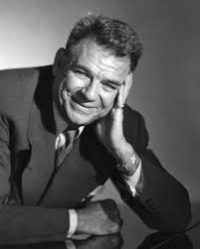
Oscar Greeley Clendenning Ritter von Hammerstein II (/ˈhæmərstaɪn/; July 12, 1895 – August 23, 1960) was an American librettist, theatrical producer, and (usually uncredited) theatre director of musicals for almost 40 years. He won eight Tony Awards and two Academy Awards for Best Original Song. Many of his songs are standard repertoire for vocalists and jazz musicians. He co-wrote 850 songs.
Hammerstein was the lyricist and playwright in his partnerships; his collaborators wrote the music. Hammerstein collaborated with numerous composers, such as Jerome Kern, with whom he wrote Show Boat, Vincent Youmans, Rudolf Friml, Richard A. Whiting, and Sigmund Romberg, but he is best known for his collaborations with Richard Rodgers, as the duo Rodgers and Hammerstein, whose collaborations include Oklahoma!, Carousel, South Pacific, The King and I, and The Sound of Music.
Hammerstein was the lyricist and playwright in his partnerships; his collaborators wrote the music. Hammerstein collaborated with numerous composers, such as Jerome Kern, with whom he wrote Show Boat, Vincent Youmans, Rudolf Friml, Richard A. Whiting, and Sigmund Romberg, but he is best known for his collaborations with Richard Rodgers, as the duo Rodgers and Hammerstein, whose collaborations include Oklahoma!, Carousel, South Pacific, The King and I, and The Sound of Music.
Bing Crosby
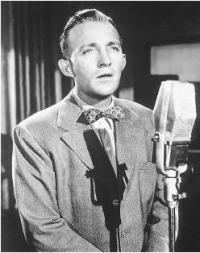
Harry Lillis “Bing” Crosby (May 3, 1903 – October 14, 1977) was an American popular singer and actor whose career lasted from 1926 until his death.
One of the first multimedia stars, from 1934 to 1954 Bing Crosby held a nearly unrivaled command of record sales, radio ratings and motion picture grosses. He is cited among the most popular musical acts in history and is currently the most electronically recorded human voice in history. Crosby is also credited as being the major inspiration for most of the male singers of the era that followed him, including Frank Sinatra, Perry Como, and Dean Martin. Yank magazine recognized Crosby as the person who had done the most for American G.I. morale during World War II and, during his peak years, around 1948, polls declared him the "most admired man alive," ahead of Jackie Robinson and Pope Pius XII. Also during 1948, the Music Digest estimated that Crosby recordings filled more than half of the 80,000 weekly hours allocated to recorded radio music.
Crosby exerted an important influence on the development of the postwar recording industry. In 1947, he invested US$50,000 in the Ampex company, which developed North America's first commercial reel-to-reel tape recorder, and Crosby became the first performer to pre-record his radio shows and master his commercial recordings on magnetic tape. He gave one of the first Ampex Model 200 recorders to his friend, musician Les Paul, which led directly to Paul's invention of multitrack recording. Along with Frank Sinatra, he was one of the principal backers behind the famous United Western Recorders studio complex in Los Angeles.
In 1962, Crosby was the first person to receive the Grammy Lifetime Achievement Award. He won an Academy Award for Best Actor for his role as Father Chuck O'Malley in the 1944 motion picture Going My Way. Crosby is one of the few people to have three stars on the Hollywood Walk of Fame.
One of the first multimedia stars, from 1934 to 1954 Bing Crosby held a nearly unrivaled command of record sales, radio ratings and motion picture grosses. He is cited among the most popular musical acts in history and is currently the most electronically recorded human voice in history. Crosby is also credited as being the major inspiration for most of the male singers of the era that followed him, including Frank Sinatra, Perry Como, and Dean Martin. Yank magazine recognized Crosby as the person who had done the most for American G.I. morale during World War II and, during his peak years, around 1948, polls declared him the "most admired man alive," ahead of Jackie Robinson and Pope Pius XII. Also during 1948, the Music Digest estimated that Crosby recordings filled more than half of the 80,000 weekly hours allocated to recorded radio music.
Crosby exerted an important influence on the development of the postwar recording industry. In 1947, he invested US$50,000 in the Ampex company, which developed North America's first commercial reel-to-reel tape recorder, and Crosby became the first performer to pre-record his radio shows and master his commercial recordings on magnetic tape. He gave one of the first Ampex Model 200 recorders to his friend, musician Les Paul, which led directly to Paul's invention of multitrack recording. Along with Frank Sinatra, he was one of the principal backers behind the famous United Western Recorders studio complex in Los Angeles.
In 1962, Crosby was the first person to receive the Grammy Lifetime Achievement Award. He won an Academy Award for Best Actor for his role as Father Chuck O'Malley in the 1944 motion picture Going My Way. Crosby is one of the few people to have three stars on the Hollywood Walk of Fame.
Bodo Wartke

The audience appreciates Bodo Wartke as a chansonnier and virtuoso pianist as well as a versatile actor and charming confériecier. The piano cabaret artist does not shy away from controversial topics in his wit and tone.
At the age of 19, Bodo Wartke performed his first full-length concert on November 16, 1996 and looks back on more than 20 years of artistic career.
At the age of 19, Bodo Wartke performed his first full-length concert on November 16, 1996 and looks back on more than 20 years of artistic career.
Bach

Johann Sebastian Bach (31 March 1685 – 28 July 1750) was a German composer and organist whose sacred and secular works for choir, orchestra, and solo instruments drew together the strands of the Baroque period and brought it to its ultimate maturity. Although he introduced no new forms, he enriched the prevailing German style with a robust contrapuntal technique, an unrivalled control of harmonic and motivic organisation in composition for diverse musical forces, and the adaptation of rhythms and textures from abroad, particularly Italy and France.
Revered for their intellectual depth and technical and artistic beauty, Bach's works include the Brandenburg concertos; the Goldberg Variations; the English Suites, French Suites, Partitas, and Well-Tempered Clavier; the Mass in B Minor; the St. Matthew Passion; the St. John Passion; The Musical Offering; The Art of Fugue; the Sonatas and Partitas for violin solo; the Cello Suites; more than 200 surviving cantatas; and a similar number of organ works, including the celebrated Toccata and Fugue in D Minor.
While Bach's fame as an organist was great during his lifetime, he was not particularly well-known as a composer. His adherence to Baroque forms and contrapuntal style was considered "old-fashioned" by his contemporaries, especially late in his career when the musical fashion tended towards Rococo and later Classical styles. A revival of interest and performances of his music began early in the 19th century, and he is now widely considered to be one of the greatest composers in the Western tradition.
Revered for their intellectual depth and technical and artistic beauty, Bach's works include the Brandenburg concertos; the Goldberg Variations; the English Suites, French Suites, Partitas, and Well-Tempered Clavier; the Mass in B Minor; the St. Matthew Passion; the St. John Passion; The Musical Offering; The Art of Fugue; the Sonatas and Partitas for violin solo; the Cello Suites; more than 200 surviving cantatas; and a similar number of organ works, including the celebrated Toccata and Fugue in D Minor.
While Bach's fame as an organist was great during his lifetime, he was not particularly well-known as a composer. His adherence to Baroque forms and contrapuntal style was considered "old-fashioned" by his contemporaries, especially late in his career when the musical fashion tended towards Rococo and later Classical styles. A revival of interest and performances of his music began early in the 19th century, and he is now widely considered to be one of the greatest composers in the Western tradition.
Traditional

Jacques Brel

Jacques Romain Georges Brel (April 8, 1929 – October 9, 1978) was a Belgian French-speaking singer-songwriter. The quality and style of his lyrics are highly regarded by many leading critics of popular music.
Brel's songs are not especially well known in the English-speaking world except in translation and through the interpretations of other singers, most famously Scott Walker and Judy Collins. Others who have sung his work in English include Marc Almond, Dave Van Ronk, Alex Harvey, David Bowie, Dusty Springfield, The Dresden Dolls, Frank Sinatra, Terry Jacks, Nina Simone, Rod McKuen, The Kingston Trio, Gavin Friday, Jack Lukeman, Dax Riggs and Beirut. In French-speaking countries, Brel is also remembered as an actor and director.
Brel's songs are not especially well known in the English-speaking world except in translation and through the interpretations of other singers, most famously Scott Walker and Judy Collins. Others who have sung his work in English include Marc Almond, Dave Van Ronk, Alex Harvey, David Bowie, Dusty Springfield, The Dresden Dolls, Frank Sinatra, Terry Jacks, Nina Simone, Rod McKuen, The Kingston Trio, Gavin Friday, Jack Lukeman, Dax Riggs and Beirut. In French-speaking countries, Brel is also remembered as an actor and director.
Yann Tiersen

Guillaume Yann Tiersen (born 23 June 1970) is a French musician and composer known internationally for composing the score to the Jean-Pierre Jeunet movie Amélie. His music is recognized by its use of a large variety of instruments in relatively minimalist compositions, often with a touch of either European classical music or French folk music, using primarily the piano, accordion or violin together with instruments like the melodica, xylophone, toy piano, ondes martenot, harpsichord and typewriter. His musical style is reminiscent of Frédéric Chopin, Erik Satie, Philip Glass and Michael Nyman.
Coldplay

Coldplay are a rock band formed in London, England in 1997. The group comprises vocalist/pianist/guitarist Chris Martin, lead guitarist Jonny Buckland, bassist Guy Berryman, and drummer/multi-instrumentalist Will Champion. Coldplay have sold 34.6 million albums, and are also known for their hit singles, such as "Yellow", "The Scientist", "Speed of Sound", "Fix You", "Viva la Vida" and the Grammy Award-winning "Clocks".
Coldplay achieved worldwide fame with the release of their single "Yellow", followed by their debut album, Parachutes (2000), which was nominated for the Mercury Prize. Its follow-up, A Rush of Blood to the Head (2002) won multiple awards such as NME's Album of the Year and was later included on Rolling Stone magazine's 500 Greatest Albums of All Time list, ranking at #473. Their next release, X&Y (2005), received a slightly less enthusiastic yet still generally positive reception. The band's fourth studio album, Viva la Vida or Death and All His Friends (2008), was produced by Brian Eno and released again to largely favourable reviews. All of Coldplay's albums have enjoyed great commercial success.
Coldplay's early material was compared to acts such as Jeff Buckley, U2, and Travis. Coldplay have been an active supporter of various social and political causes, such as Oxfam's Make Trade Fair campaign and Amnesty International. The group have also performed at various charity projects such as Band Aid 20, Live 8, and the Teenage Cancer Trust.
Coldplay achieved worldwide fame with the release of their single "Yellow", followed by their debut album, Parachutes (2000), which was nominated for the Mercury Prize. Its follow-up, A Rush of Blood to the Head (2002) won multiple awards such as NME's Album of the Year and was later included on Rolling Stone magazine's 500 Greatest Albums of All Time list, ranking at #473. Their next release, X&Y (2005), received a slightly less enthusiastic yet still generally positive reception. The band's fourth studio album, Viva la Vida or Death and All His Friends (2008), was produced by Brian Eno and released again to largely favourable reviews. All of Coldplay's albums have enjoyed great commercial success.
Coldplay's early material was compared to acts such as Jeff Buckley, U2, and Travis. Coldplay have been an active supporter of various social and political causes, such as Oxfam's Make Trade Fair campaign and Amnesty International. The group have also performed at various charity projects such as Band Aid 20, Live 8, and the Teenage Cancer Trust.
The Fray
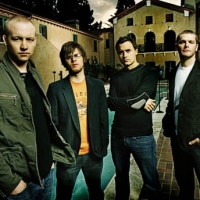
The Fray is a Grammy Award-nominated four-piece piano rock American band from Denver, Colorado. Formed in 2002 by schoolmates Isaac Slade and Joe King, the band released their debut album How to Save a Life in 2005. The band is best known for the song "How to Save a Life", which charted in the top three of the Billboard Hot 100 and was also a top 5 single in Canada, Australia, Ireland, Sweden, and the United Kingdom. The Fray also found national success with the song "Over My Head (Cable Car)", which became a top ten hit in the United States and Canada. How to Save a Life was certified double platinum by the Recording Industry Association of America and was also certified platinum in Australia and New Zealand.
The Fray was formed in 2002, and currently consists of Isaac Slade (vocals and piano), Joe King (guitar and vocals), Dave Welsh (guitar) and Ben Wysocki (drums and percussion). While the band has no official bass guitarist, Dan Lavery of Tonic has been the touring bassist since March 2007. Prior to Dan joining the touring fold, Jimmy Stofer, also a member of the band Hello Kavita, was employed as the band's touring bassist from 2005 through February 2007.
The Fray was formed in 2002, and currently consists of Isaac Slade (vocals and piano), Joe King (guitar and vocals), Dave Welsh (guitar) and Ben Wysocki (drums and percussion). While the band has no official bass guitarist, Dan Lavery of Tonic has been the touring bassist since March 2007. Prior to Dan joining the touring fold, Jimmy Stofer, also a member of the band Hello Kavita, was employed as the band's touring bassist from 2005 through February 2007.
Schumann

Robert Schumann, sometimes given as Robert Alexander Schumann, (June 8, 1810 – July 29, 1856) was a German composer, aesthete and influential music critic. He is one of the most famous Romantic composers of the 19th century.
He had hoped to pursue a career as a virtuoso pianist, having been assured by his teacher Friedrich Wieck that he could become the finest pianist in Europe after only a few years of study with him. However, a hand injury prevented those hopes from being realized, and he decided to focus his musical energies on composition. Schumann's published compositions were, until 1840, all for the piano; he later composed works for piano and orchestra, many lieder (songs for voice and piano), four symphonies, an opera, and other orchestral, choral and chamber works. His writings about music appeared mostly in the Neue Zeitschrift für Musik ("The New Journal for Music"), a Leipzig-based publication that he jointly founded.
In 1840, after a long and acrimonious legal battle with his piano instructor Friedrich Wieck, Schumann married Wieck's daughter, pianist Clara Wieck, a considerable figure of the Romantic period in her own right. Clara Wieck showcased many works by her husband as well. For the last two years of his life, after an attempted suicide, Schumann was confined to a mental institution.
He had hoped to pursue a career as a virtuoso pianist, having been assured by his teacher Friedrich Wieck that he could become the finest pianist in Europe after only a few years of study with him. However, a hand injury prevented those hopes from being realized, and he decided to focus his musical energies on composition. Schumann's published compositions were, until 1840, all for the piano; he later composed works for piano and orchestra, many lieder (songs for voice and piano), four symphonies, an opera, and other orchestral, choral and chamber works. His writings about music appeared mostly in the Neue Zeitschrift für Musik ("The New Journal for Music"), a Leipzig-based publication that he jointly founded.
In 1840, after a long and acrimonious legal battle with his piano instructor Friedrich Wieck, Schumann married Wieck's daughter, pianist Clara Wieck, a considerable figure of the Romantic period in her own right. Clara Wieck showcased many works by her husband as well. For the last two years of his life, after an attempted suicide, Schumann was confined to a mental institution.
Michael Jackson

Michael Joseph Jackson (August 29, 1958 – June 25, 2009) was an American singer, dancer and entertainer. Referred to as the King of Pop, he is the most commercially successful entertainer of all time, and one of the most influential. His contributions to music, dance and fashion, along with a much publicized personal life, made him a global figure in popular culture for over four decades.
Alongside his brothers, he made his debut as lead singer and youngest member of The Jackson 5 in 1964. He began his solo career in 1971. His 1982 album Thriller remains the best-selling album ever, with Off the Wall (1979), Bad (1987), Dangerous (1991) and HIStory (1995) also among the world's best-selling albums. He is widely credited with having transformed the music video from a promotional tool into an art form with videos for his songs such as "Billie Jean", "Beat It" and "Thriller" making him the first African American artist to amass a strong crossover following on MTV. With stage performances and music videos, Jackson popularized a number of physically complicated dance techniques, such as the robot and the moonwalk. His distinctive musical sound, vocal style, and choreography, is credited with stretching across and breaking down cultural, racial, economic, generational, and global barriers that has inspired countless pop, rock, R&B and hip hop artists.
One of the few artists to have been inducted into the Rock and Roll Hall of Fame twice, his other achievements feature multiple Guinness World Records—including the "Most Successful Entertainer of All Time"—15 Grammy Awards (including the "Living Legend Award" and the "Lifetime Achievement Award"), 26 American Music Awards (24 only as a solo artist, including one for "Artist of the Century")—more than any artist—, 17 number one singles in the US (including the four as a member of the Jackson 5), and estimated sales of up to 750 million records worldwide making him the world's best selling artist in history.
Jackson's personal relationships and life generated controversy for years. His changing appearance was noticed from the late 1970s onwards, with changes to his nose and to the color of his skin drawing media publicity. He was accused of child sexual abuse in 1993 though no charges were brought, and in 2005 he was tried and acquitted when the jury ruled him not guilty on all charges. He married twice, first in 1994 and again in 1996, and brought up three children, one born to a surrogate mother. While preparing for the This Is It concert tour in 2009, Jackson died at the age of 50 after suffering from cardiac arrest. He reportedly had been administered drugs such as propofol and lorazepam, and his death was ruled a homicide by the Los Angeles County coroner. His death triggered an outpouring of grief from around the world with his globally live broadcast memorial service attracting an audience of up to one billion people; as well as a huge surge in his album sales, resulting in him becoming the best selling artist of 2009 with sales in excess of 8.2 million in the United States where he became the first artist ever to have 4 of the top 20 best-selling albums in a single year, and 29 million albums globally, where he had an unprecedented 8 of the top 25 best-selling albums worldwide.
Alongside his brothers, he made his debut as lead singer and youngest member of The Jackson 5 in 1964. He began his solo career in 1971. His 1982 album Thriller remains the best-selling album ever, with Off the Wall (1979), Bad (1987), Dangerous (1991) and HIStory (1995) also among the world's best-selling albums. He is widely credited with having transformed the music video from a promotional tool into an art form with videos for his songs such as "Billie Jean", "Beat It" and "Thriller" making him the first African American artist to amass a strong crossover following on MTV. With stage performances and music videos, Jackson popularized a number of physically complicated dance techniques, such as the robot and the moonwalk. His distinctive musical sound, vocal style, and choreography, is credited with stretching across and breaking down cultural, racial, economic, generational, and global barriers that has inspired countless pop, rock, R&B and hip hop artists.
One of the few artists to have been inducted into the Rock and Roll Hall of Fame twice, his other achievements feature multiple Guinness World Records—including the "Most Successful Entertainer of All Time"—15 Grammy Awards (including the "Living Legend Award" and the "Lifetime Achievement Award"), 26 American Music Awards (24 only as a solo artist, including one for "Artist of the Century")—more than any artist—, 17 number one singles in the US (including the four as a member of the Jackson 5), and estimated sales of up to 750 million records worldwide making him the world's best selling artist in history.
Jackson's personal relationships and life generated controversy for years. His changing appearance was noticed from the late 1970s onwards, with changes to his nose and to the color of his skin drawing media publicity. He was accused of child sexual abuse in 1993 though no charges were brought, and in 2005 he was tried and acquitted when the jury ruled him not guilty on all charges. He married twice, first in 1994 and again in 1996, and brought up three children, one born to a surrogate mother. While preparing for the This Is It concert tour in 2009, Jackson died at the age of 50 after suffering from cardiac arrest. He reportedly had been administered drugs such as propofol and lorazepam, and his death was ruled a homicide by the Los Angeles County coroner. His death triggered an outpouring of grief from around the world with his globally live broadcast memorial service attracting an audience of up to one billion people; as well as a huge surge in his album sales, resulting in him becoming the best selling artist of 2009 with sales in excess of 8.2 million in the United States where he became the first artist ever to have 4 of the top 20 best-selling albums in a single year, and 29 million albums globally, where he had an unprecedented 8 of the top 25 best-selling albums worldwide.
Star Salzman

Star Salzman Musical artist Born: June 15, 1982 (age 39 years) Songs Long Night Complete Works · 2007 Remind Me of Saturday Morning Complete Works · 2007 The Long Road to October Complete Works · 2007
Hiromi

Hiromi Uehara, known professionally as Hiromi, is a jazz composer and pianist born in Hamamatsu, Japan. She is known for her virtuosic technique, energetic live performances and blend of musical genres such as stride, post-bop, progressive rock, classical and fusion in her compositions.
Danny Elfman

Daniel Robert "Danny" Elfman (born May 29, 1953) is an American musician, best known for composing music for television and movies, and leading the rock band Oingo Boingo as singer/songwriter from 1976 until its breakup in 1995. He is a frequent collaborator with long-time friend Tim Burton, and has scored all but two of his films. He was nominated for four Academy Awards and won a Grammy Award for Tim Burton's Batman and an Emmy Award for his Desperate Housewives theme. Elfman also wrote the theme for the video game Fable. He is also famous for creating The Simpsons main title theme, and his role as Jack Skellington's singing voice in The Nightmare Before Christmas. He is the Uncle in-law to actress Jenna Elfman.
Alan Silvestri

Alan Anthony Silvestri (born March 26, 1950) is an Academy Award-nominated American film score composer and conductor.
estri is best known for his collaborations with director Robert Zemeckis, having scored Romancing the Stone (1984), the Back to the Future trilogy (1985, 1989, 1990), Who Framed Roger Rabbit (1988), Death Becomes Her (1992), Forrest Gump (1994), Contact (1997), Cast Away (2000), The Polar Express (2004) , Beowulf (2007) and Disney's A Christmas Carol (2009).
Silvestri is also known for his work on Predator (1987) and Predator 2 (1990), both of which are considered preeminent examples of action/sci-fi film scores. He has also begun a collaboration with director Stephen Sommers, scoring the films The Mummy Returns in 2001, Van Helsing in 2004 and G.I. Joe: The Rise of Cobra in 2009.
Silvestri also composed music for television, including for the series Starsky & Hutch, CHiPs , Manimal and HBO's Tales from the Crypt.
Silvestri was 21 years old when he started his film/televsion composing career.
His early style is marked by a strong use of the "octatonic scale," as well as an eclectic use of different notes and instruments.
It was thought that Silvestri was allegedly inspired by the works of Barry DeVorzon, Perry Botkin, Jr., Lalo Schifrin, Jerry Fielding, Jerry Goldsmith and John Williams.
estri is best known for his collaborations with director Robert Zemeckis, having scored Romancing the Stone (1984), the Back to the Future trilogy (1985, 1989, 1990), Who Framed Roger Rabbit (1988), Death Becomes Her (1992), Forrest Gump (1994), Contact (1997), Cast Away (2000), The Polar Express (2004) , Beowulf (2007) and Disney's A Christmas Carol (2009).
Silvestri is also known for his work on Predator (1987) and Predator 2 (1990), both of which are considered preeminent examples of action/sci-fi film scores. He has also begun a collaboration with director Stephen Sommers, scoring the films The Mummy Returns in 2001, Van Helsing in 2004 and G.I. Joe: The Rise of Cobra in 2009.
Silvestri also composed music for television, including for the series Starsky & Hutch, CHiPs , Manimal and HBO's Tales from the Crypt.
Silvestri was 21 years old when he started his film/televsion composing career.
His early style is marked by a strong use of the "octatonic scale," as well as an eclectic use of different notes and instruments.
It was thought that Silvestri was allegedly inspired by the works of Barry DeVorzon, Perry Botkin, Jr., Lalo Schifrin, Jerry Fielding, Jerry Goldsmith and John Williams.
Sarah McLachlan

Sarah Ann McLachlan, OC, OBC (born January 28, 1968) is a Grammy-winning Canadian musician, singer and songwriter.
She is known for the emotional sound of her ballads. Some of her most popular songs include "Angel", "Building a Mystery", "Adia", "Possession", "Fallen", "I Will Remember You", and "World on Fire". As of 2006, she has sold over 40 million albums worldwide. Her best-selling album to date is Surfacing, for which she won eight Juno Awards and three Grammy Awards. In addition to her personal artistic efforts, she founded the Lilith Fair tour, which showcased female musicians in the late 1990s.
Her 1991 album, Solace, was her mainstream breakthrough in Canada, spawning the hit singles "The Path of Thorns (Terms)" and "Into the Fire". Solace also marked the beginning of her partnership with Pierre Marchand. Marchand and McLachlan have been collaborators ever since, with Marchand producing all of McLachlan's albums and occasionally co-writing songs.
1994's Fumbling Towards Ecstasy was an immediate smash hit in Canada. From her Nettwerk connection, her piano version of the song "Possession" was included on the first Due South soundtrack in 1996. Over the next two years, Fumbling Towards Ecstasy quietly became McLachlan's international breakthrough as well, scaling the charts in a number of countries.
Following the success from Fumbling Towards Ecstasy, McLachlan returned in 1997 with Surfacing, her best selling album to date. Earning her two Grammy awards and four Junos, the album has since sold over 11 million copies worldwide and brought her much international success
She is known for the emotional sound of her ballads. Some of her most popular songs include "Angel", "Building a Mystery", "Adia", "Possession", "Fallen", "I Will Remember You", and "World on Fire". As of 2006, she has sold over 40 million albums worldwide. Her best-selling album to date is Surfacing, for which she won eight Juno Awards and three Grammy Awards. In addition to her personal artistic efforts, she founded the Lilith Fair tour, which showcased female musicians in the late 1990s.
Her 1991 album, Solace, was her mainstream breakthrough in Canada, spawning the hit singles "The Path of Thorns (Terms)" and "Into the Fire". Solace also marked the beginning of her partnership with Pierre Marchand. Marchand and McLachlan have been collaborators ever since, with Marchand producing all of McLachlan's albums and occasionally co-writing songs.
1994's Fumbling Towards Ecstasy was an immediate smash hit in Canada. From her Nettwerk connection, her piano version of the song "Possession" was included on the first Due South soundtrack in 1996. Over the next two years, Fumbling Towards Ecstasy quietly became McLachlan's international breakthrough as well, scaling the charts in a number of countries.
Following the success from Fumbling Towards Ecstasy, McLachlan returned in 1997 with Surfacing, her best selling album to date. Earning her two Grammy awards and four Junos, the album has since sold over 11 million copies worldwide and brought her much international success
Bill Evans

William John Evans, known as Bill Evans (August 16, 1929 – September 15, 1980) was an American jazz pianist. His use of impressionist harmony, inventive interpretation of traditional jazz repertoire, and trademark rhythmically independent, "singing" melodic lines influenced a generation of pianists, including Chick Corea, Herbie Hancock, John Taylor, Steve Kuhn, Don Friedman, Denny Zeitlin, Bobo Stenson and Keith Jarrett, as well as guitarists Lenny Breau and Pat Metheny. The music of Bill Evans continues to inspire younger pianists like Marcin Wasilewski, Fred Hersch, Ray Reach, Bill Charlap, Lyle Mays, Eliane Elias and arguably Brad Mehldau, early in his career.
Evans is an inductee of the Down Beat Jazz Hall of Fame.
Evans is an inductee of the Down Beat Jazz Hall of Fame.
Leslie Wagle

she is a female musician doing new age arrangements and cover music.
Francesco Barsanti
Francesco Barsanti (1690–1775) was an Italian flautist, oboist and composer. He was born in 1690 in the Tuscan city of Lucca, but spent most of his life in London and Edinburgh.Very little is known about Barsanti's background. His father may or may not have been the opera librettist Giovanni Nicolao Barsanti (Il Temistocle) but this has never been proved. He studied law in Padua as a young man, but abandoned it to pursue a career in music. In 1714 Barsanti emigrated to London with Francesco Geminiani, another musician from Lucca who was several years his senior. He played oboe and recorder, and soon obtained a post in the opera orchestra at the Haymarket where Handel's operas were being produced. Nerici reports that he returned briefly to Lucca in 1717 and again in 1718 to play in the Festival of the Holy Cross, 'for a very high salary.'[3
Vocaloid

Vocaloid (ボーカロイド, Bōkaroido) is a singing voice synthesizer software product. Its signal processing part was developed through a joint research project led by Kenmochi Hideki at the Pompeu Fabra University in Barcelona, Spain, in 2000 and was not originally intended to be a full commercial project. Backed by the Yamaha Corporation, it developed the software into the commercial product "Vocaloid" that was released in 2004.
George Gershwin

George Gershwin (September 26, 1898 – July 11, 1937) was an American composer. He wrote most of his vocal and theatrical works in collaboration with his elder brother, lyricist Ira Gershwin. George Gershwin composed songs both for Broadway and for the classical concert hall. He also wrote popular songs with success.
Many of his compositions have been used on television and in numerous films, and many became jazz standards. The jazz singer Ella Fitzgerald recorded many of the Gershwins' songs on her 1959 Gershwin Songbook (arranged by Nelson Riddle). Countless singers and musicians have recorded Gershwin songs, including Fred Astaire, Louis Armstrong, Al Jolson, Bobby Darin, Art Tatum, Bing Crosby, Janis Joplin, John Coltrane, Frank Sinatra, Billie Holiday, Sam Cooke, Miles Davis, Herbie Hancock, Madonna, Judy Garland, Julie Andrews, Barbra Streisand, Marni Nixon, Natalie Cole, Patti Austin, Nina Simone, Maureen McGovern, John Fahey, The Residents, Than & Sam, Sublime, and Sting. A residential building is named after him on the Stony Brook University campus.
Many of his compositions have been used on television and in numerous films, and many became jazz standards. The jazz singer Ella Fitzgerald recorded many of the Gershwins' songs on her 1959 Gershwin Songbook (arranged by Nelson Riddle). Countless singers and musicians have recorded Gershwin songs, including Fred Astaire, Louis Armstrong, Al Jolson, Bobby Darin, Art Tatum, Bing Crosby, Janis Joplin, John Coltrane, Frank Sinatra, Billie Holiday, Sam Cooke, Miles Davis, Herbie Hancock, Madonna, Judy Garland, Julie Andrews, Barbra Streisand, Marni Nixon, Natalie Cole, Patti Austin, Nina Simone, Maureen McGovern, John Fahey, The Residents, Than & Sam, Sublime, and Sting. A residential building is named after him on the Stony Brook University campus.
Ravel

Joseph-Maurice Ravel (March 7, 1875 – December 28, 1937) was a French composer of Impressionist music known especially for his melodies, orchestral and instrumental textures and effects. Much of his piano music, chamber music, vocal music and orchestral music has entered the standard concert repertoire.
Ravel's piano compositions, such as Jeux d'eau, Miroirs and Gaspard de la Nuit, demand considerable virtuosity from the performer, and his orchestral music, including Daphnis et Chloé and his arrangement of Modest Mussorgsky's Pictures at an Exhibition, uses a variety of sound and instrumentation very effectively.
Ravel is perhaps known best for his orchestral work, Boléro (1928), which he considered trivial and once described as "a piece for orchestra without music."
According to SACEM, Ravel's estate earns more royalties than that of any other French musician. According to international copyright law, Ravel's works are public domain since January 1, 2008 in most countries. In France, due to anomalous copyright law extensions to account for the two world wars, they will not enter the public domain until 2015.
Ravel's piano compositions, such as Jeux d'eau, Miroirs and Gaspard de la Nuit, demand considerable virtuosity from the performer, and his orchestral music, including Daphnis et Chloé and his arrangement of Modest Mussorgsky's Pictures at an Exhibition, uses a variety of sound and instrumentation very effectively.
Ravel is perhaps known best for his orchestral work, Boléro (1928), which he considered trivial and once described as "a piece for orchestra without music."
According to SACEM, Ravel's estate earns more royalties than that of any other French musician. According to international copyright law, Ravel's works are public domain since January 1, 2008 in most countries. In France, due to anomalous copyright law extensions to account for the two world wars, they will not enter the public domain until 2015.
Sergey Rahmaninov
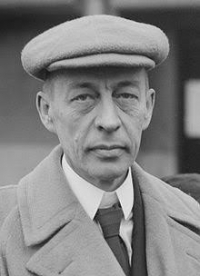
Sergei Vasilievich Rachmaninoff, Russian composer, conductor, pianist. He is one of the greatest pianists and composers of the 20th century. He was the last great composer of Russian romanticism. After the October Revolution in his country, he settled in the USA and became a US citizen
George Frideric Handel

George Frideric (or Frederick) Handel (/ˈhændəl/; born Georg Friederich Händel (About this soundlisten); 23 February 1685 (O.S.) – 14 April 1759) was a German, later British, Baroque composer who spent the bulk of his career in London, becoming well known for his operas, oratorios, anthems, and organ concertos. Handel received important training in Halle and worked as a composer in Hamburg and Italy before settling in London in 1712; he became a naturalised British subject in 1727. He was strongly influenced both by the great composers of the Italian Baroque and by the middle-German polyphonic choral tradition.
Damien Rice

Damien Rice (born December 7, 1973) is an Irish folk singer. He was born in Dublin, Ireland, to George and Maureen Rice and was raised in Celbridge, County Kildare, Ireland. He is also a distant relative of the famous Dubliner Katharine Rice.
He has released five albums: O, B-Sides, 9, Live At Fingerprints Warts & All, and Live from the Union Chapel.
Thanks to David Arnold, his second cousin, Rice was able to record O, which was released in 2003. O was dedicated to fellow Irish musician Mic Christopher. The album was a strong commercial success and won the Shortlist Music Prize.
Three years later, following extensive promotion of O in Ireland and further commercial success worldwide, Rice released his second studio album 9 in 2006. The album was recorded in 2004 and 2005, and released on November 3 in Ireland, on November 6 in Europe and the rest of the world and lastly on November 14 in North America.
He has released five albums: O, B-Sides, 9, Live At Fingerprints Warts & All, and Live from the Union Chapel.
Thanks to David Arnold, his second cousin, Rice was able to record O, which was released in 2003. O was dedicated to fellow Irish musician Mic Christopher. The album was a strong commercial success and won the Shortlist Music Prize.
Three years later, following extensive promotion of O in Ireland and further commercial success worldwide, Rice released his second studio album 9 in 2006. The album was recorded in 2004 and 2005, and released on November 3 in Ireland, on November 6 in Europe and the rest of the world and lastly on November 14 in North America.
Ennio Morricone
Ennio Morricone, OMRI (born November 10, 1928), is an Italian composer and conductor. He has composed and arranged scores for more than 500 film and television productions. Morricone is considered as one of the most influential film composers since the late 1950s. He is well-known for his long-term collaborations with international acclaimed directors such as Sergio Leone, Brian De Palma, Barry Levinson, and Giuseppe Tornatore.
He wrote the characteristic film scores of Leone's Spaghetti Westerns A Fistful of Dollars (1964), For a Few Dollars More (1965), The Good, the Bad and the Ugly (1966), Once Upon a Time in the West (1968), The Great Silence (1968), and My Name Is Nobody (1973). In the 80s, Morricone composed the scores for John Carpenter's horror movie The Thing (1982), Leone's Once Upon a Time in America (1984), Roland Joffé's The Mission (1986), Brian De Palma's The Untouchables (1987) and Giuseppe Tornatore's Cinema Paradiso (1988).
His more recent compositions include the scores for Oliver Stone's U Turn (1997), Tornatore's The Legend of 1900 (1998) and Malèna (2000), Mission to Mars (2000) by Brian De Palma, Fateless (2005), and Baaria - La porta del vento (2009). Ennio Morricone has won two Grammy Awards, two Golden Globes and five Anthony Asquith Awards for Film Music by BAFTA in 1979–1992. He has been nominated for five Academy Awards for Best Music, Original Score in 1979–2001. Morricone received the Honorary Academy Award in 2007 "for his magnificent and multifaceted contributions to the art of film music". He was the second composer to receive this award after its introduction in 1928.
He wrote the characteristic film scores of Leone's Spaghetti Westerns A Fistful of Dollars (1964), For a Few Dollars More (1965), The Good, the Bad and the Ugly (1966), Once Upon a Time in the West (1968), The Great Silence (1968), and My Name Is Nobody (1973). In the 80s, Morricone composed the scores for John Carpenter's horror movie The Thing (1982), Leone's Once Upon a Time in America (1984), Roland Joffé's The Mission (1986), Brian De Palma's The Untouchables (1987) and Giuseppe Tornatore's Cinema Paradiso (1988).
His more recent compositions include the scores for Oliver Stone's U Turn (1997), Tornatore's The Legend of 1900 (1998) and Malèna (2000), Mission to Mars (2000) by Brian De Palma, Fateless (2005), and Baaria - La porta del vento (2009). Ennio Morricone has won two Grammy Awards, two Golden Globes and five Anthony Asquith Awards for Film Music by BAFTA in 1979–1992. He has been nominated for five Academy Awards for Best Music, Original Score in 1979–2001. Morricone received the Honorary Academy Award in 2007 "for his magnificent and multifaceted contributions to the art of film music". He was the second composer to receive this award after its introduction in 1928.
Heitor Villa-Lobos

Heitor Villa-Lobos (March 5, 1887 – November 17, 1959) was a Brazilian composer, described as "the single most significant creative figure in 20th-century Brazilian art music". Villa-Lobos has become the best-known and most significant Latin American composer to date. He wrote numerous orchestral, chamber, instrumental and vocal works. His music was influenced by both Brazilian folk music and by stylistic elements from the European classical tradition, as exemplified by his Bachianas Brasileiras ("Brazilian Bachian-pieces").
His earliest pieces originated in guitar improvisations, for example Panqueca ("Pancake") of 1900. The concert series of 1915–21 included first performances of pieces demonstrating originality and virtuosic technique. Some of these pieces are early examples of elements of importance throughout his œuvre. His attachment to the Iberian Peninsula is demonstrated in Canção Ibéria of 1914 and in orchestral transcriptions of some of Enrique Granados' piano Goyescas (1918, now lost). Other themes that were to recur in his later work include the anguish and despair of the piece Desesperança— Sonata Phantastica e Capricciosa no. 1 (1915), a violin sonata including "histrionic and violently contrasting emotions", the birds of L'oiseau blessé d'une flèche (1913), the mother-child relationship (not usually a happy one in Villa-Lobos's music) in Les mères of 1914, and the flowers of Suíte floral for piano of 1916–18 which reappeared in Distribuição de flores for flute and guitar of 1937.
Reconciling European tradition and Brazilian influences was also an element that bore fruit more formally later. His earliest published work Pequena suíte for cello and piano of 1913 shows a love for the cello, but is not notably Brazilian, although it contains elements that were to resurface later. His three-movement String Quartet no. 1 (Suíte graciosa) of 1915 (expanded to six movements ca. 1947) is influenced by European opera, while Três danças características (africanas e indígenas) of 1914–16 for piano, later arranged for octet and subsequently orchestrated, is radically influenced by the tribal music of the Caripunas Indians of Mato Grosso.
With his tone poems Amazonas (1916, first performed in Paris in 1929) and Uirapurú (1916, first performed 1935) he created works dominated by indigenous Brazilian influences. The works use Brazilian folk tales and characters, imitations of the sounds of the jungle and its fauna, imitations of the sound of the nose-flute by the violinophone, and not least imitations of the uirapuru itself.
His earliest pieces originated in guitar improvisations, for example Panqueca ("Pancake") of 1900. The concert series of 1915–21 included first performances of pieces demonstrating originality and virtuosic technique. Some of these pieces are early examples of elements of importance throughout his œuvre. His attachment to the Iberian Peninsula is demonstrated in Canção Ibéria of 1914 and in orchestral transcriptions of some of Enrique Granados' piano Goyescas (1918, now lost). Other themes that were to recur in his later work include the anguish and despair of the piece Desesperança— Sonata Phantastica e Capricciosa no. 1 (1915), a violin sonata including "histrionic and violently contrasting emotions", the birds of L'oiseau blessé d'une flèche (1913), the mother-child relationship (not usually a happy one in Villa-Lobos's music) in Les mères of 1914, and the flowers of Suíte floral for piano of 1916–18 which reappeared in Distribuição de flores for flute and guitar of 1937.
Reconciling European tradition and Brazilian influences was also an element that bore fruit more formally later. His earliest published work Pequena suíte for cello and piano of 1913 shows a love for the cello, but is not notably Brazilian, although it contains elements that were to resurface later. His three-movement String Quartet no. 1 (Suíte graciosa) of 1915 (expanded to six movements ca. 1947) is influenced by European opera, while Três danças características (africanas e indígenas) of 1914–16 for piano, later arranged for octet and subsequently orchestrated, is radically influenced by the tribal music of the Caripunas Indians of Mato Grosso.
With his tone poems Amazonas (1916, first performed in Paris in 1929) and Uirapurú (1916, first performed 1935) he created works dominated by indigenous Brazilian influences. The works use Brazilian folk tales and characters, imitations of the sounds of the jungle and its fauna, imitations of the sound of the nose-flute by the violinophone, and not least imitations of the uirapuru itself.
F.T. Island

F.T. Island (Korean: 에프티 아일랜드, or FT아일랜드, short for Five Treasure Island), is a South Korean rock band formed by FNC Entertainment in 2007. The band currently consists of main vocalist Lee Hong-gi, bassist Lee Jae-jin, and drummer Choi Min-hwan. Guitarist Oh Won-bin left the band in 2009 and was replaced by Song Seung-hyun. Former leader Choi Jong-hoon left the band and retired from the entertainment industry on March 14, 2019, while Seung-hyun left the group on December 31, 2019, to pursue his acting career.
honore diakanua wayawa

Arranger, Composer, Publisher Democratic Republic of the Congo, kinshasa.Born in the Democratic Republic of Congo July 10 to Kinshasa.He needs your comments and criticisms for the improvement of his work.
Norah Jones
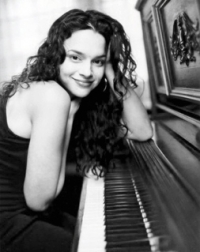
Norah Jones (born Geethali Norah Jones Shankar on March 30, 1979) is an American singer-songwriter, pianist, keyboardist, guitarist, and occasional actress of Anglo-American and Bengali descent. She is the daughter of famed sitar virtuoso Ravi Shankar and half-sister of sitarist Anoushka Shankar.
Jones' career was launched with her 2002 debut album Come Away with Me, an adult contemporary pop/vocal jazz album with a sensual, plaintive soul/folk/country tinge, that sold over twenty million copies worldwide and received five Grammy Awards, with Jones winning "Best New Artist". Her second album, Feels like Home, was released in 2004, clocking more than a million sales in the first week of U.S. release. In 2007, she released her third album, Not Too Late, which debuted at number one on the world charts. She has become one of the most successful recording artists of the decade, racking up sales of more than 16 million records in the US and 39 million records worldwide.
Jones' career was launched with her 2002 debut album Come Away with Me, an adult contemporary pop/vocal jazz album with a sensual, plaintive soul/folk/country tinge, that sold over twenty million copies worldwide and received five Grammy Awards, with Jones winning "Best New Artist". Her second album, Feels like Home, was released in 2004, clocking more than a million sales in the first week of U.S. release. In 2007, she released her third album, Not Too Late, which debuted at number one on the world charts. She has become one of the most successful recording artists of the decade, racking up sales of more than 16 million records in the US and 39 million records worldwide.
Card Captor Sakura
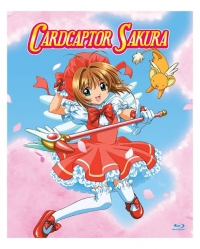
TV anime DirectorMorio AsakaMusicStudioMadhouseChannel NHK, Animax Star TV Disney Channel Screenings7 April 1998-21 March 2000Chapter 70 Movie: Cardcaptor SakuraManagerMorio AsakaStudioMadhouseMovie 21 August 1998Vision time 79 min
Philip Glass

Philip Glass (born January 31, 1937) is a three-time Academy Award-nominated American classical music composer. He is considered one of the most influential composers of the late-20th century and is widely acknowledged as a composer who has brought art music to the American public (along with precursors such as Richard Strauss, Kurt Weill and Leonard Bernstein).
His music is described as minimalist, from which he distanced himself in being a composer of "music with repetitive structures". Although his early, mature music is minimalist, he has evolved stylistically. Currently, he describes himself as a "Classicist", trained in harmony and counterpoint and studied Johann Sebastian Bach, Ludwig van Beethoven, and Franz Schubert.
Glass is a prolific composer: he has written ensemble works, operas, eight symphonies, eight concertos, film scores, and solo works. Glass counts many visual artists, writers, musicians, and directors among his friends, including Richard Serra, Chuck Close, Doris Lessing, Allen Ginsberg, Errol Morris, Robert Wilson, JoAnne Akalaitis, John Moran, actors Bill Treacher and Peter Dean, Godfrey Reggio, Ravi Shankar, Linda Ronstadt, Paul Simon, David Bowie, Patti Smith, the conductor Dennis Russell Davies, and electronic musician Aphex Twin, who have all collaborated with him. Among recent collaborators are Glass's fellow New Yorkers Leonard Cohen, and Woody Allen. He composed an opera for the opening of Expo '98.
His music is described as minimalist, from which he distanced himself in being a composer of "music with repetitive structures". Although his early, mature music is minimalist, he has evolved stylistically. Currently, he describes himself as a "Classicist", trained in harmony and counterpoint and studied Johann Sebastian Bach, Ludwig van Beethoven, and Franz Schubert.
Glass is a prolific composer: he has written ensemble works, operas, eight symphonies, eight concertos, film scores, and solo works. Glass counts many visual artists, writers, musicians, and directors among his friends, including Richard Serra, Chuck Close, Doris Lessing, Allen Ginsberg, Errol Morris, Robert Wilson, JoAnne Akalaitis, John Moran, actors Bill Treacher and Peter Dean, Godfrey Reggio, Ravi Shankar, Linda Ronstadt, Paul Simon, David Bowie, Patti Smith, the conductor Dennis Russell Davies, and electronic musician Aphex Twin, who have all collaborated with him. Among recent collaborators are Glass's fellow New Yorkers Leonard Cohen, and Woody Allen. He composed an opera for the opening of Expo '98.
Noa

Achinoam Nini (Hebrew: אחינועם ניני, romanized: Aẖinóʿam Nini; born June 23, 1969), also known professionally as Noa (נועה), is an Israeli singer-songwriter, percussionist, poet, composer, and human rights activist working internationally. She is accompanied by guitarist Gil Dor and often plays the conga drums and percussions as she sings. Noa represented Israel at the Eurovision Song Contest in 2009 together with singer Mira Awad, with the song "There Must Be Another Way". Her music is known to fuse languages and styles. She has performed in 52 countries and was the first Israeli artist to perform in the Vatican.
Paolo Agostini
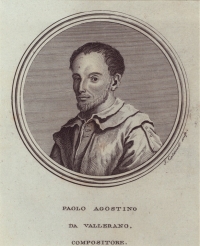
Paolo Agostini was an Italian composer and organist of the early Baroque era. He was born perhaps at Vallerano, near Viterbo. He studied under Giovanni Bernardino Nanino, according to the dedication in the third and fourth books of his masses. Subsequently, he married Nanino's daughter.
Bang Kieu
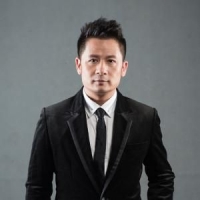
Nguyễn Bằng Kiều, is a Vietnamese ballad singer. He is a former member of bands including Golden Keys, Frangipani, and Watermelon. In 2000, he became a solo artist. In 2002, he relocated to America and married female singer Trizzie Phuong Trinh. From 2004 to 2008, his Vietnam citizenship was revoked.
Brahms

Johannes Brahms (May 7, 1833 â April 3, 1897) was a German composer of the Romantic period. He was born in Hamburg and in his later years he settled in Vienna, Austria.
Brahms maintained a Classical sense of form and order in his works â in contrast to the opulence of the music of many of his contemporaries. Thus many admirers (though not necessarily Brahms himself) saw him as the champion of traditional forms and "pure music," as opposed to the New German embrace of program music.
Brahms venerated Beethoven: in the composer's home, a marble bust of Beethoven looked down on the spot where he composed, and some passages in his works are reminiscent of Beethoven's style. The main theme of the finale of Brahms's First Symphony is reminiscent of the main theme of the finale of Beethoven's Ninth, and when this resemblance was pointed out to Brahms he replied that any ass â jeder Esel â could see that.
Ein deutsches Requiem was partially inspired by his mother's death in 1865, but also incorporates material from a Symphony he started in 1854, but abandoned following Schumann's suicide attempt. He once wrote that the Requiem "belonged to Schumann". The first movement of this abandoned Symphony was re-worked as the first movement of the First Piano Concerto.
Brahms also loved the Classical composers Mozart and Haydn. He collected first editions and autographs of their works, and edited performing editions. He also studied the music of pre-classical composers, including Giovanni Gabrieli, Johann Adolph Hasse, Heinrich Schütz and especially Johann Sebastian Bach. His friends included leading musicologists, and with Friedrich Chrysander he edited an edition of the works of François Couperin. He looked to older music for inspiration in the arts of strict counterpoint; the themes of some of his works are modelled on Baroque sources, such as Bach's The Art of Fugue in the fugal finale of Cello Sonata No. 1, or the same composer's Cantata No. 150 in the passacaglia theme of the Fourth Symphony's finale.
Brahms maintained a Classical sense of form and order in his works â in contrast to the opulence of the music of many of his contemporaries. Thus many admirers (though not necessarily Brahms himself) saw him as the champion of traditional forms and "pure music," as opposed to the New German embrace of program music.
Brahms venerated Beethoven: in the composer's home, a marble bust of Beethoven looked down on the spot where he composed, and some passages in his works are reminiscent of Beethoven's style. The main theme of the finale of Brahms's First Symphony is reminiscent of the main theme of the finale of Beethoven's Ninth, and when this resemblance was pointed out to Brahms he replied that any ass â jeder Esel â could see that.
Ein deutsches Requiem was partially inspired by his mother's death in 1865, but also incorporates material from a Symphony he started in 1854, but abandoned following Schumann's suicide attempt. He once wrote that the Requiem "belonged to Schumann". The first movement of this abandoned Symphony was re-worked as the first movement of the First Piano Concerto.
Brahms also loved the Classical composers Mozart and Haydn. He collected first editions and autographs of their works, and edited performing editions. He also studied the music of pre-classical composers, including Giovanni Gabrieli, Johann Adolph Hasse, Heinrich Schütz and especially Johann Sebastian Bach. His friends included leading musicologists, and with Friedrich Chrysander he edited an edition of the works of François Couperin. He looked to older music for inspiration in the arts of strict counterpoint; the themes of some of his works are modelled on Baroque sources, such as Bach's The Art of Fugue in the fugal finale of Cello Sonata No. 1, or the same composer's Cantata No. 150 in the passacaglia theme of the Fourth Symphony's finale.
Heart

Heart is a rock band formed in Bellevue, Washington (a suburb of Seattle) and Vancouver, British Columbia. Going through several lineup changes, the only constant members of the group are sisters Ann and Nancy Wilson. The group rose to fame in the 1970s with their music being influenced by hard rock as well as folk music. After diminishing in popularity by the mid-80's, the band created a major comeback in 1985 experiencing further success with their power ballads throughout the rest of the decade. By the mid-1990s, Heart left their 80's sound and went back to their hard rock roots which they continue to play today. They have sold over 30 million albums worldwide and were ranked #57 on VH1's "100 Greatest Artists of Hard Rock".
Doris Day
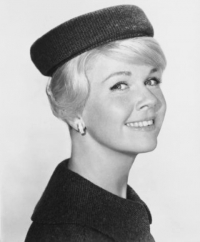
Doris Day (born Doris Mary Anne Kappelhoff; April 3, 1922 – May 13, 2019) was an American actress, singer, and animal welfare activist. She began her career as a big band singer in 1939, achieving commercial success in 1945 with two No. 1 recordings, "Sentimental Journey" and "My Dreams Are Getting Better All the Time" with Les Brown & His Band of Renown. She left Brown to embark on a solo career and recorded more than 650 songs from 1947 to 1967.
Alexis Jordan

Alexis Jordan is an American singer and actress from Columbia, South Carolina. Jordan rose to fame as a contestant on the first season of America's Got Talent in 2006 at the age of 14. After being eliminated from the show, she began to upload cover songs to YouTube, which received millions of views.
Balakirev
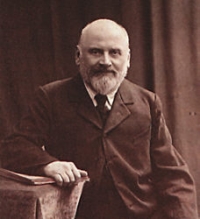
Mily Alexeyevich Balakirev (Russian: Милий Алексеевич Балакирев, Milij Alekseevič Balakirev, 1910) was a Russian pianist, conductor and composer. He is known today primarily for his work promoting musical nationalism in Russia. Working in conjunction with critic Vladimir Stasov, Balakirev brought together the composers now known as the Five, encouraged their efforts and acted as a musical midwife both for them and for Pyotr Ilyich Tchaikovsky.
Balakirev began his career as a pivotal figure in Russian music by extending and developing the fusion began by Mikhail Glinka of traditional Russian and boldly experimental music. In doing so, he established musical patterns that could express overtly nationalistic feeling. He not only demonstrated in his own works how this could be done, but also by taking amateur musicians of prescribed musical education but enormous potential such as Modest Mussorgsky, Alexander Borodin and Nikolai Rimsky-Korsakov, he imparted his own musical beliefs and passed them on to underlie the thinking of his pupils.
Balakirev found himself in an unusual position in his later yers of attending premieres of works he had begun long ago but had only recently completed. For instance, he began writing his First Symphony in 1864 but finished it in 1897. Often, the musical ideas normally associated with Rimsky-Korsakov or Borodin actually originated in Balakirev's compositions. However, his slowness in bringing his works before the public robbed him of credit for his inventiveness. Also, pieces which if completed in the 1860s and 70s would have enjoyed success if they had been performed at that time actually made a much smaller impact when they were introduced toward the end of the composer's life because they had been overtaken by the accomplishments of younger composers. The exception to this is his oriental fantasy Islamey, which is still popular among pianists.
Balakirev began his career as a pivotal figure in Russian music by extending and developing the fusion began by Mikhail Glinka of traditional Russian and boldly experimental music. In doing so, he established musical patterns that could express overtly nationalistic feeling. He not only demonstrated in his own works how this could be done, but also by taking amateur musicians of prescribed musical education but enormous potential such as Modest Mussorgsky, Alexander Borodin and Nikolai Rimsky-Korsakov, he imparted his own musical beliefs and passed them on to underlie the thinking of his pupils.
Balakirev found himself in an unusual position in his later yers of attending premieres of works he had begun long ago but had only recently completed. For instance, he began writing his First Symphony in 1864 but finished it in 1897. Often, the musical ideas normally associated with Rimsky-Korsakov or Borodin actually originated in Balakirev's compositions. However, his slowness in bringing his works before the public robbed him of credit for his inventiveness. Also, pieces which if completed in the 1860s and 70s would have enjoyed success if they had been performed at that time actually made a much smaller impact when they were introduced toward the end of the composer's life because they had been overtaken by the accomplishments of younger composers. The exception to this is his oriental fantasy Islamey, which is still popular among pianists.
Mika

Mica Penniman (born 18 August 1983), known as Mika, is a Lebanese-born, London-based, Grammy-nominated and BRIT Award-winning singer-songwriter, who has a recording contract with Casablanca Records and Universal Music. He rose to fame around the end of 2006 and the start of 2007. His birth name is Michael Holbrook Penniman.
Joe Hisaishi

Mamoru Fujisawa (藤澤 守 Fujisawa Mamoru?), known professionally as Joe Hisaishi (久石 譲 Hisaishi Jō?, born December 6, 1950), is a composer and director known for over 100 film scores and solo albums dating back to 1981.
While possessing a stylistically distinct sound, Hisaishi's music has been known to explore and incorporate different genres, including minimalist, experimental electronic, European classical, and Japanese classical. Lesser known are the other musical roles he plays; he is also a typesetter, author, arranger, and head of an orchestra.
He is best known for his work with animator Hayao Miyazaki, having composed scores for many of his films including Nausicaä of the Valley of the Wind (1984), My Neighbor Totoro (1988), Princess Mononoke (1997), Spirited Away (2001), Howl's Moving Castle (2004) and Ponyo (2008). He is also recognized for the soundtracks he has provided for filmmaker 'Beat' Takeshi Kitano, including Dolls (2002), Kikujiro (1999), Hana-bi (1997), Kids Return (1996), Sonatine (1993).
While possessing a stylistically distinct sound, Hisaishi's music has been known to explore and incorporate different genres, including minimalist, experimental electronic, European classical, and Japanese classical. Lesser known are the other musical roles he plays; he is also a typesetter, author, arranger, and head of an orchestra.
He is best known for his work with animator Hayao Miyazaki, having composed scores for many of his films including Nausicaä of the Valley of the Wind (1984), My Neighbor Totoro (1988), Princess Mononoke (1997), Spirited Away (2001), Howl's Moving Castle (2004) and Ponyo (2008). He is also recognized for the soundtracks he has provided for filmmaker 'Beat' Takeshi Kitano, including Dolls (2002), Kikujiro (1999), Hana-bi (1997), Kids Return (1996), Sonatine (1993).
Giuseppe Donizetti

Giuseppe Donizetti. Italian musician. Turkey in the 19th century who introduced the first in Turkey and western music band which Mûsikâ-i Humayun's development is the person who provided the largest contribution
Debussy

Achille-Claude Debussy (August 22, 1862 – March 25, 1918) was a French composer. Along with Maurice Ravel, he is considered one of the most prominent figures working within the field of Impressionist music, though he himself intensely disliked the term when applied to his compositions. Debussy was not only among the most important of all French composers but also was a central figure in all European music at the turn of the twentieth century.
Debussy's music virtually defines the transition from late-Romantic music to twentieth century modernist music. In French literary circles, the style of this period was known as Symbolism, a movement that directly inspired Debussy both as a composer and as an active cultural participant.
Debussy's music virtually defines the transition from late-Romantic music to twentieth century modernist music. In French literary circles, the style of this period was known as Symbolism, a movement that directly inspired Debussy both as a composer and as an active cultural participant.
Chopin

Frédéric Chopin (1 March 1810 – 17 October 1849) was a Polish composer and virtuoso pianist of the Romantic period. He is widely regarded as the greatest Polish composer, and ranks as one of music's greatest tone poets.
He was born in the village of Żelazowa Wola, in the Duchy of Warsaw, to a Polish mother and French-expatriate father, and in his early life was regarded as a child-prodigy pianist. In November 1830, at the age of 20, Chopin went abroad; following the suppression of the Polish November Uprising of 1830–31, he became one of many expatriates of the Polish "Great Emigration."
In Paris, he made a comfortable living as a composer and piano teacher, while giving few public performances. A Polish patriot,
Chopin's extant compositions were written primarily for the piano as a solo instrument. Though technically demanding, Chopin's style emphasizes nuance and expressive depth rather than virtuosity. Chopin invented musical forms such as the ballade and was responsible for major innovations in forms such as the piano sonata, waltz, nocturne, étude, impromptu and prelude. His works are mainstays of Romanticism in 19th-century classical music.
He was born in the village of Żelazowa Wola, in the Duchy of Warsaw, to a Polish mother and French-expatriate father, and in his early life was regarded as a child-prodigy pianist. In November 1830, at the age of 20, Chopin went abroad; following the suppression of the Polish November Uprising of 1830–31, he became one of many expatriates of the Polish "Great Emigration."
In Paris, he made a comfortable living as a composer and piano teacher, while giving few public performances. A Polish patriot,
Chopin's extant compositions were written primarily for the piano as a solo instrument. Though technically demanding, Chopin's style emphasizes nuance and expressive depth rather than virtuosity. Chopin invented musical forms such as the ballade and was responsible for major innovations in forms such as the piano sonata, waltz, nocturne, étude, impromptu and prelude. His works are mainstays of Romanticism in 19th-century classical music.
HUGO WOLF
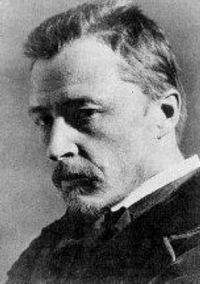
Hugo Philipp Jacob Wolf (13 March 1860 – 22 February 1903) was an Austrian composer of Slovene origin, particularly noted for his art songs, or Lieder. He brought to this form a concentrated expressive intensity which was unique in late Romantic music, somewhat related to that of the Second Viennese School in concision but diverging greatly in technique.
Though he had several bursts of extraordinary productivity, particularly in 1888 and 1889, depression frequently interrupted his creative periods, and his last composition was written in 1898, before he suffered a mental collapse caused by syphilis.
Though he had several bursts of extraordinary productivity, particularly in 1888 and 1889, depression frequently interrupted his creative periods, and his last composition was written in 1898, before he suffered a mental collapse caused by syphilis.
Ogie Alcasid
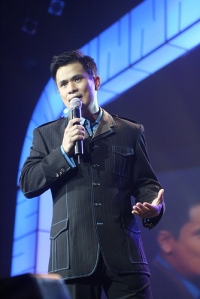
Herminio Alcasid, Jr., more popularly known as Ogie Alcasid (born August 27, 1967), is a Filipino singer, songwriter, comedian, composer, television host, actor, and entrepreneur.
Alcasid debuted as a singer in 1989 with the release of his self-titled album. Ogie Alcasid reached gold record status, while his debut single "Nandito Ako" (Here I Am) was awarded "Song of the Year" by local radio station Magic 89.9. He has since released 18 albums, including a Christmas album (Larawan ng Pasko/ Images of Christmas, 1994), a live album (OA sa Hits (Live), 2002), and four greatest hits albums.
He has received a total of five gold records, three platinum records, and three double platinum records.
Alcasid debuted as a singer in 1989 with the release of his self-titled album. Ogie Alcasid reached gold record status, while his debut single "Nandito Ako" (Here I Am) was awarded "Song of the Year" by local radio station Magic 89.9. He has since released 18 albums, including a Christmas album (Larawan ng Pasko/ Images of Christmas, 1994), a live album (OA sa Hits (Live), 2002), and four greatest hits albums.
He has received a total of five gold records, three platinum records, and three double platinum records.
Giovanni Pierluigi da Palestrina

Giovanni Pierluigi da Palestrina (b. 3 February 1525 – 2 February 1526; d. 2 February 1594) was an Italian Renaissance composer and the most well-known 16th-century representative of the Roman School of musical composition. Palestrina became famous through his output of sacred music. He had an enormous influence on the development of Roman Catholic church music, and his work has often been seen as the culmination of Renaissance polyphony. It is only recently, with the discovery and publication of a great deal of hitherto unknown or forgotten music by various Renaissance composers, that we have had the means to properly assess Palestrina in historical context.
W.A. Mozart

Wolfgang Amadeus Mozart (German: , full baptismal name Johannes Chrysostomus Wolfgangus Theophilus Mozart (27 January 1756 – 5 December 1791), was a prolific and influential composer of the Classical era. He composed over 600 works, many acknowledged as pinnacles of symphonic, concertante, chamber, piano, operatic, and choral music. He is among the most enduringly popular of classical composers.
Mozart showed prodigious ability from his earliest childhood in Salzburg. Already competent on keyboard and violin, he composed from the age of five and performed before European royalty; at 17 he was engaged as a court musician in Salzburg, but grew restless and traveled in search of a better position, always composing abundantly. While visiting Vienna in 1781, he was dismissed from his Salzburg position. He chose to stay in the capital, where he achieved fame but little financial security. During his final years in Vienna, he composed many of his best-known symphonies, concertos, and operas, and the Requiem. The circumstances of his early death have been much mythologized. He was survived by his wife Constanze and two sons.
Mozart learned voraciously from others, and developed a brilliance and maturity of style that encompassed the light and graceful along with the dark and passionate—the whole informed by a vision of humanity "redeemed through art, forgiven, and reconciled with nature and the absolute." His influence on subsequent Western art music is profound. Beethoven wrote his own early compositions in the shadow of Mozart, of whom Joseph Haydn wrote that "posterity will not see such a talent again in 100 years."
Mozart showed prodigious ability from his earliest childhood in Salzburg. Already competent on keyboard and violin, he composed from the age of five and performed before European royalty; at 17 he was engaged as a court musician in Salzburg, but grew restless and traveled in search of a better position, always composing abundantly. While visiting Vienna in 1781, he was dismissed from his Salzburg position. He chose to stay in the capital, where he achieved fame but little financial security. During his final years in Vienna, he composed many of his best-known symphonies, concertos, and operas, and the Requiem. The circumstances of his early death have been much mythologized. He was survived by his wife Constanze and two sons.
Mozart learned voraciously from others, and developed a brilliance and maturity of style that encompassed the light and graceful along with the dark and passionate—the whole informed by a vision of humanity "redeemed through art, forgiven, and reconciled with nature and the absolute." His influence on subsequent Western art music is profound. Beethoven wrote his own early compositions in the shadow of Mozart, of whom Joseph Haydn wrote that "posterity will not see such a talent again in 100 years."
Prokofiev

Sergei Sergeyevich Prokofiev (Russian: Сергей Сергеевич Прокофьев; Ukrainian: Сергій Сергійович Прокоф'єв) (27 April 1891 – 5 March 1953) was a Russian composer, pianist and conductor who mastered numerous musical genres and came to be admired as one of the greatest composers of the 20th century.
Prokofiev was a soloist with the London Symphony Orchestra, conducted by Piero Coppola, in the first recording of his Piano Concerto No. 3, recorded in London by His Master's Voice in June 1932. Prokofiev also recorded some of his solo piano music for HMV in Paris in February 1935; these recordings were issued on CD by Pearl and Naxos. In 1938, he conducted the Moscow Philharmonic Orchestra in a recording of the second suite from his Romeo and Juliet ballet; this performance was also later released on LP and CD. Another reported recording with Prokofiev and the Moscow Philharmonic was of the First Violin Concerto with David Oistrakh as soloist; Everest Records later released this recording on an LP.
Prokofiev was a soloist with the London Symphony Orchestra, conducted by Piero Coppola, in the first recording of his Piano Concerto No. 3, recorded in London by His Master's Voice in June 1932. Prokofiev also recorded some of his solo piano music for HMV in Paris in February 1935; these recordings were issued on CD by Pearl and Naxos. In 1938, he conducted the Moscow Philharmonic Orchestra in a recording of the second suite from his Romeo and Juliet ballet; this performance was also later released on LP and CD. Another reported recording with Prokofiev and the Moscow Philharmonic was of the First Violin Concerto with David Oistrakh as soloist; Everest Records later released this recording on an LP.
Nicola Vaccai
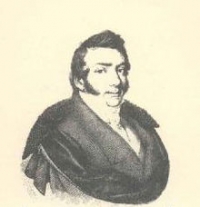
Nicola Vaccai (15 March 1790 - 5 or 6 August 1848) was an Italian composer, particularly of operas, and a singing teacher.
The Eagles
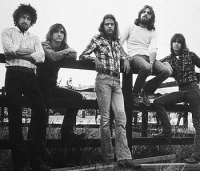
The Eagles are an American rock band formed in Los Angeles, California in 1971 by Glenn Frey, Don Henley, Bernie Leadon and Randy Meisner.
With five number one singles and six number one albums, the Eagles were one of the most successful recording artists of the 1970s. At the end of the 20th century, two of their albums, Their Greatest Hits (1971–1975) and Hotel California, ranked among the 20 best-selling albums in the U.S. according to the Recording Industry Association of America. Hotel California is ranked 37th in Rolling Stone's 500 Greatest Albums of All Time, and the band was ranked #75 on the magazine's 2004 list of the 100 Greatest Artists of All Time. They also have the best selling album in the U.S. to date with Eagles: Their Greatest Hits 1971–1975.
The Eagles broke up in 1980, but reunited in 1994 for Hell Freezes Over, a mix of live and new studio tracks. They have toured intermittently since then, and were inducted into the Rock and Roll Hall of Fame in 1998. In 2007, Eagles released Long Road out of Eden, their first full studio album in 28 years. The next year they launched The Long Road out of Eden Tour in support of the album. The tour continued on into 2009, crossing North America and Europe, with its last date on July 22, 2009 in Lisbon, Portugal.
With five number one singles and six number one albums, the Eagles were one of the most successful recording artists of the 1970s. At the end of the 20th century, two of their albums, Their Greatest Hits (1971–1975) and Hotel California, ranked among the 20 best-selling albums in the U.S. according to the Recording Industry Association of America. Hotel California is ranked 37th in Rolling Stone's 500 Greatest Albums of All Time, and the band was ranked #75 on the magazine's 2004 list of the 100 Greatest Artists of All Time. They also have the best selling album in the U.S. to date with Eagles: Their Greatest Hits 1971–1975.
The Eagles broke up in 1980, but reunited in 1994 for Hell Freezes Over, a mix of live and new studio tracks. They have toured intermittently since then, and were inducted into the Rock and Roll Hall of Fame in 1998. In 2007, Eagles released Long Road out of Eden, their first full studio album in 28 years. The next year they launched The Long Road out of Eden Tour in support of the album. The tour continued on into 2009, crossing North America and Europe, with its last date on July 22, 2009 in Lisbon, Portugal.
 Sheet Music Max is a site for those who wants to access popular sheet music easily,
letting them download the sheet music for free for trial purposes.
It's completely free to download and try the listed sheet music, but you have to delete the files after 24 hours of trial.
Don't forget, if you like the piece of music you have just learned playing,
treat the artist with respect, and go buy the original sheet music.
Sheet Music Max is a site for those who wants to access popular sheet music easily,
letting them download the sheet music for free for trial purposes.
It's completely free to download and try the listed sheet music, but you have to delete the files after 24 hours of trial.
Don't forget, if you like the piece of music you have just learned playing,
treat the artist with respect, and go buy the original sheet music.